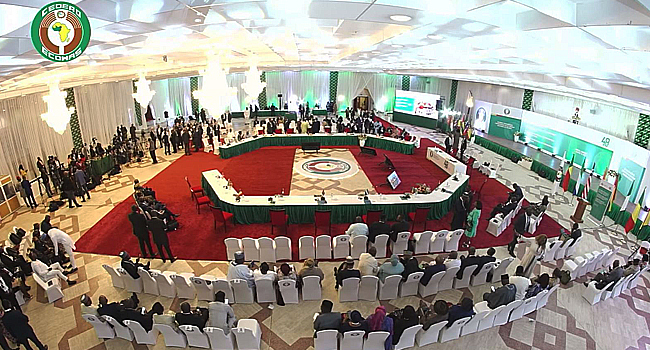The Economic Community of West African States (ECOWAS) has stated that the choice to remove sanctions on Mali, Niger, and Burkina Faso was driven by the imperative to uphold regional cohesion and security.
Dr. Omar Touray, President of the ECOWAS Commission, made these remarks at the conclusion of the extraordinary session of the Heads of State and Government of ECOWAS on Saturday in Abuja.
He mentioned that the authority acknowledged the significance of the Lenten period and the upcoming month of Ramadan, as well as their impact on citizens. Additionally, he noted that appeals were received from prominent leaders, including retired Gen. Yakubu Gowon.
”The authority takes note that the withdrawal will have political, social, socio economic, financial and institutional implications for the three countries as well as for ECOWAS as a region.
”The authority recalls that within the framework of regional cooperation against terrorism, violent extremism and organised crime, the three countries benefited from about 100 million US dollars mobilised by UMR within the context of ECOWAS plan of action against terrorism.
”Moreover, some funds allocation, about 7.5 million U.S. dollars is being made towards supporting the three countries in acquiring the equipment to help their fight against terrorism.
”The withdrawal will affect security cooperation in terms of sharing intelligence and participation in regional counterterrorism initiatives.
”Such as the Accra initiative, and the Multinational Joint Task Force,’‘ he said.
Touray added that the withdrawal of the countries from the sub-regional bloc would lead to diplomatic and political isolation at the international scene where the countries have obtained support for their candidates in the contest for international positions.
”The authority recognises that the withdrawal will automatically affect the immigration status of the citizens, as they may be required to obtain visas to travel around the region.
”Citizens may no longer be able to reside or set up businesses under ECOWAS arrangement and may be subject to diverse national laws.
The three nations will transition from utilizing ECOWAS passports to adopting biometric national identity cards and the brown card for vehicle insurance.
”The authority recognises that the three member states represent 17.4 per cent of the region’s 425 million population.
Despite comprising 10% of the region’s GDP, their departure will result in a reduction of ECOWAS’s market size.
He noted that the lifting of sanctions aims to foster trade and capitalize on the advantages offered by various regional projects and programs, such as the Regional Food Security Reserve.
”The regional support programme for powerful pastoralism in the Sahel, which is being funded by the World Bank to the tune of 215 million US dollars is also a project that benefits the three countries.
”The three countries also benefit from the Sahel regional irrigation support programme, which is being funded by the World Bank to the tune of 103 million US dollars.
”The three regional food systems resilient support programme in the amount of 230 million, funded by the World Bank is also benefiting the three countries.
”West African single identity and regional integration and inclusion project is another programme that the three countries benefit from.”
He mentioned that the countries also benefit from other projects, such as the ECOWAS regional electricity market and the West African Power Pool project, which connect member states to a regional electricity grid to enhance electricity accessibility.
He warned that failure to lift the sanctions would lead to the cessation or suspension of all ECOWAS projects and programs worth over 500 million US dollars.
Touray stated that these projects have a combined value of approximately 321.6 million US dollars.
”Reviewing the implications at the institutional level, the authority notes that the withdrawal will not only require the closure of four regional entities in Burkina Faso, two regional bodies in Mali and one regional office in Asia.
”It will also affect the job security of some 130 ECOWAS staff who are citizens of the three countries. Currently 77 staff members are from Burkina Faso, 23 are from Mali, and 32 are from Niger.


